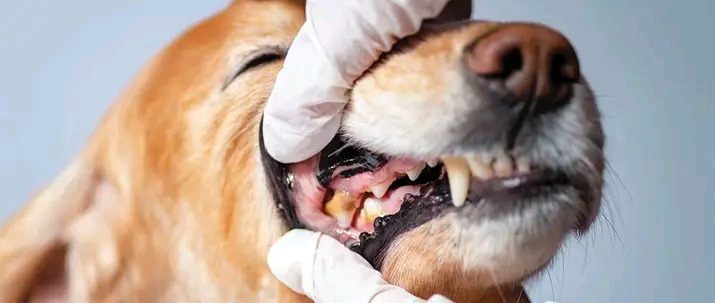DENTAL HEALTH IN PET
Dental health is critically important for pets, just as it is for humans. Proper dental care can significantly impact a pet’s overall health and well-being. Here’s an extensive overview of dental health in pets, covering why it matters, signs of dental issues, preventive care, and treatment options:
Why Dental Health Matters for Pets:Preventing Dental Disease: Poor dental hygiene can lead to various dental diseases in pets, including periodontal disease, gingivitis, tooth decay, and oral infections.
Pain and Discomfort: Untreated dental issues can cause pain, difficulty eating, bad breath, and behavioral changes in pets.Signs of Dental Issues:
Bad Breath (Halitosis): Persistent bad breath is often a sign of dental disease.Changes in Eating Habits: Reluctance to eat hard food, dropping food from the mouth, or chewing on one side of the mouth.
Visible Signs: Red or swollen gums, yellow/brown tartar build-up on teeth, and excessive drooling.Behavioral Changes: Irritability, reluctance to be touched around the mouth, or pawing at the face.

Preventive Dental Care for Pets:Regular Brushing: Brush your pet’s teeth daily using toothpaste designed for pets. Start gradually, using a finger brush or gauze to introduce the routine.
Dental Chews and Toys: Offer dental chews or toys designed to help clean teeth and massage gums.Healthy Diet: Feed your pet a balanced diet that supports dental health, avoiding too many sugary treats.Dental Chews and Toys: Provide dental treats and toys designed to help clean teeth and massage gums.Dietary Considerations: Feed pets a balanced diet to support dental health.
Veterinary Dental Exams: Schedule regular dental check-ups with your veterinarian. Professional cleanings may be needed to remove tartar and address underlying issues.
Treatment Options for Dental Issues:Professional Dental Cleaning: This involves scaling to remove tartar above and below the gum line, followed by polishing to smooth the tooth surface.
Extractions: If a tooth is severely decayed or damaged, extraction may be necessary to prevent further infection.Antibiotics and Pain Management: In cases of advanced dental disease or infection, your vet may prescribe antibiotics and pain relief.
DENTAL HEALTH IN PET
Additional Considerations:
Anesthesia: Some dental procedures require anesthesia for safety and thorough cleaning.
Home Care: Your vet may recommend specific at-home care routines or products tailored to your pet’s dental needs.
Regular Monitoring: Dental health should be monitored throughout a pet’s life, with adjustments made as needed based on age and health status.
Professional Guidance: Always consult with your veterinarian for personalized advice and treatment plans.
Dental health is a crucial aspect of overall wellness in pets, often overlooked but essential for their comfort, longevity, and quality of life. Just like humans, animals require regular dental care to prevent dental disease, which can have serious consequences if left untreated. Here’s an extensive overview of dental health in pets:
Importance of Dental Health in Pets:
Prevention of Dental Disease: Regular dental care helps prevent common dental issues in pets such as periodontal disease, tooth decay, and gingivitis.
Overall Health Impact: Dental disease can lead to more severe health problems like heart, kidney, and liver disease due to bacteria entering the bloodstream from infected gums.
DENTAL HEALTH IN PET
Comfort and Well-being: Pets with healthy teeth are more likely to eat comfortably and enjoy their food, leading to better nutrition and overall well-being.
Common Dental Issues in Pets:
Periodontal Disease: This is one of the most common dental conditions in pets, characterized by inflammation and infection of the gums and surrounding tissues. It can lead to tooth loss and systemic health issues.
Gingivitis: Inflammation of the gums caused by bacteria and plaque buildup.
Tooth Fractures: Pets, especially dogs, can experience broken teeth from chewing on hard objects.
Signs of Dental Problems:
Bad Breath (halitosis): Foul-smelling breath is often a sign of dental disease.Difficulty Eating or Loss of Appetite: Pets may avoid eating due to pain or discomfort.
Drooling: Excessive drooling can indicate oral pain.Visible Tartar or Discoloration: Yellow or brown buildup on teeth is a sign of plaque accumulation.
DENTAL HEALTH IN PET
Professional Dental Cleanings: Veterinarians can perform professional dental cleanings under anesthesia to address plaque and tartar buildup.
Pet Dental Care by Species:
Dogs: Dogs are prone to dental disease, especially small breeds. Regular brushing and dental care are crucial.
Cats: Cats also benefit from dental care, though they may require more gentle handling. Dental treats and toys can help keep their teeth clean.
Small Mammals: Rabbits, guinea pigs, and other small mammals can develop dental problems due to improper diet or genetics. They may require specific dental care.
In summary, prioritizing dental health in pets is crucial for their overall health and quality of life. By practicing good dental hygiene at home and scheduling regular veterinary check-ups, you can help ensure your pet maintains a healthy smile and avoids serious dental problems.
Conclusion:
Maintaining good dental health in pets is vital for their overall health and happiness. By practicing preventive dental care, including regular veterinary visits, brushing teeth, and providing appropriate toys and treats, pet owners can significantly reduce the risk of dental disease and ensure their pets lead long and healthy lives. If you notice any signs of dental problems in your pet, consult your veterinarian promptly for proper diagnosis and treatment.
DENTAL HEALTH IN PET